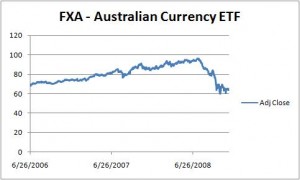A very interesting thing about the current financial crisis is the rise of the US Dollar. Its interesting because when economies collapse in other countries – the national currency also crashes. However, as the US economy heads for a deep recession, the dollar gains in strength every day.
The dollar has gained against all major currencies (except the yen), and especially against the Australian Dollar. To put things in perspective, when compared with other currencies, the Australian Dollar did gain significantly more against the US dollar, in the past year or so.
Australia is a resource rich country and exports a lot of its minerals to countries like – China, which will spend a lot on expanding its local infrastructure in the next few years.
The fact that a substantial part of China’s stimulus package is devoted to building infrastructure is good news for Australia. The other positive thing about Australia is that it is one of the few developed countries that have been impacted very little by the global crisis.
How to invest in the Australian Dollar?
For an ordinary investor, the easiest way is – buying an Exchange Traded Fund that tracks the price of the Australian dollar against the US dollar.
Currency Shares Australian Dollar ETF (FXA) does exactly this. Here is a chart of how it moved over the last couple of years.
Here is a list of some other currency ETFs that you may be interested in.
You can invest directly in Forex too, but, that may not be a good option for regular investors as the leverage in Forex is much higher than equities and you may stand to lose a lot of money.
Note: I am not a financial advisor and this should not be treated as a buy recommendation on the ETF.

